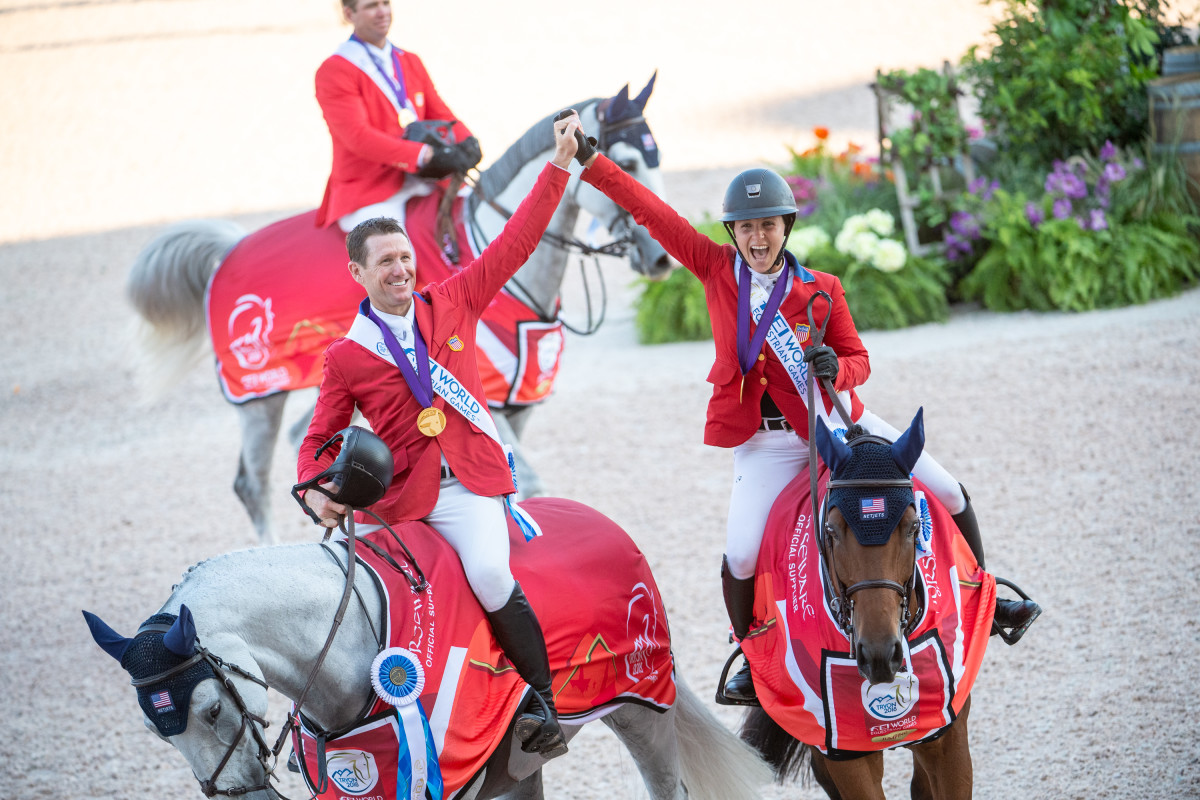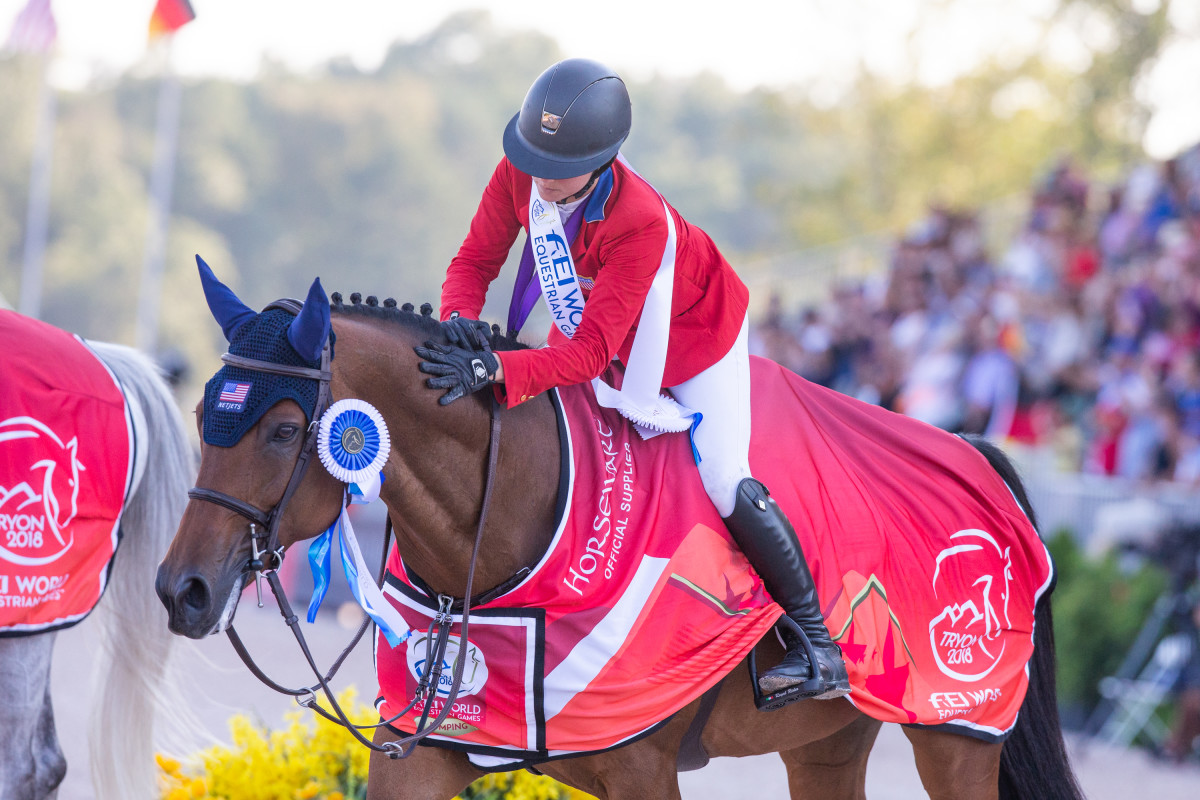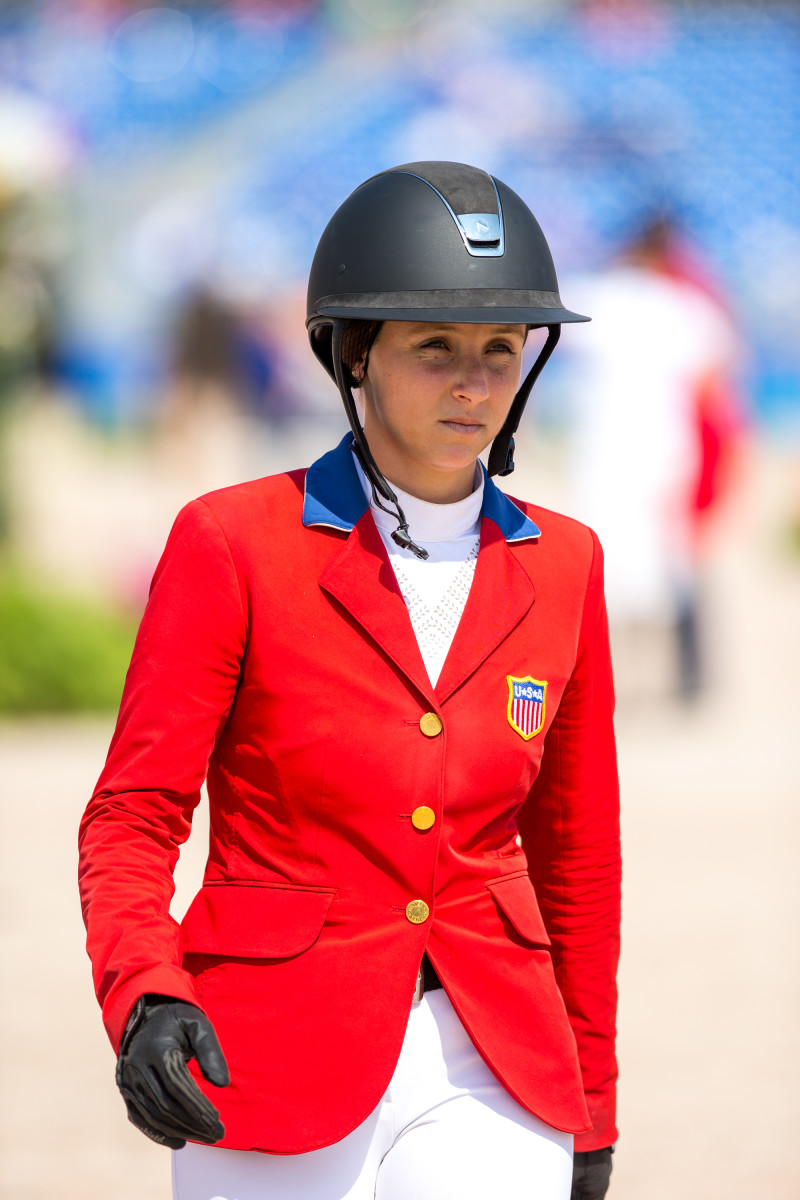Although 27-year-old Adrienne Sternlicht’s main passion has always been riding, she has taken an unorthodox path to the top of the sport. Adrienne competed on ponies successfully, but unlike many riders who go on to compete in juniors and equitation, Adrienne’s parents encouraged her to scale back on her riding during high school and instead focus on her studies and other extracurricular activities in an effort to become a more well-rounded individual.
While working on her bachelor’s degree in public policy at Brown University, Adrienne returned to show jumping. She graduated in 2016 and decided to focus full-time on the sport. It was also in 2016 that Adrienne also began training full-time with four-time Olympian McLain Ward and purchased and began her partnership with her beloved mare, Cristalline or “Stella.”
Adrienne made her Nations Cup debut in May 2017 with Stella, where they helped the U.S. team win the silver medal in Mexico. She continued on to be a member of several Nations Cup teams and collected numerous individual top placings, resulting in her selection to the U.S. Show Jumping Team for the 2018 World Equestrian Games where she and Stella helped the U.S. team clinch a historic victory over Sweden, bringing home the gold medal for the U.S. for the first time in 32 years.
Most recently, Adrienne won back-to-back World Cup qualifiers—first at the Longines FEI Jumping World Cup™ Thermal, where she and Benny’s Legacy (whom she had only jumped at three events prior) took the top spot on the podium, and then again a week later at the Longines FEI Jumping World Cup™ Las Vegas, again with Benny’s Legacy. With these two wins, Adrienne is now sitting third in the standings for the Eastern League, which determines the riders who will qualify for the World Cup Final in Las Vegas this April.
I caught up with Adrienne at the Washington International Horse Show in October where we chatted before she set off for a run in the nation’s capital. During our conversation, Adrienne shared what she’s learned from McLain, how she developed her partnership with Stella, her pre-competition routine, mental strategies for success in the saddle and more.
You can listen to the full interview wherever you listen to podcasts, but in the meantime, below is a snippet of our conversation.
McLain Ward has been such a huge mentor to you, what have you learned from him?
AS: I don’t know where to start. It’s a very refined operation. He is quite simple about the way he does everything. While he’s a genius at managing the horses and picking horses and planning their schedules, we don’t do anything super intricate or bizarre at home. There are no secrets to his program besides good riding and good horsemanship. He’s simplified or almost demystified the sport for me at the highest level.

Even now, I’m amazed at how there’s a thousand ways to get from Rome to Rio. I think his program is wildly different from some other top riders’ programs and both work. So, one thing he’s really taught me is finding what works for you which is definitely a bit of trial and error and is something that I believe as riders we’re always refining and honing. But he made me realize that it didn’t need to be as complicated as I often wanted to make it seem.
Cristalline is very special to you and you have a special bond with her. Can you talk a little bit about how you developed that?
AS: She was a pipe dream for me. Even now, I would say she is my greatest motivation 100 percent is to be as good as I can for her. What that looks like for me, is showing up in every way I can. When I got her at first, I was so in awe of the horse that I was a little bit afraid to get into her on the flat. She was only eight, so she had a lot of work to be done on the development side but I was just amazed by her and being around her. She has a very quiet and calm demeanor. It’s funny now because I’ve been on the road so much this fall and every time I come home, the first thing I do is go to her stall and she’s really annoyed at me and my groom, Emma that we leave her. Seriously, she’s very cold. It takes her about a day to warm back up to us. I think she’s annoyed that we keep leaving but she’ll be with us soon.

She’s definitely my best friend. I don’t feel like I’m riding a horse when I’m with her. I treasure the time that I spend with her, whether it’s wandering around on foot or in the saddle—she’s something different.
Do you have a routine before a competition? Do you get nervous?
AS: Yes, I really have a routine. I don’t get nervous in the sense of the height of the fences but I think I get anxious in an anticipatory sense. I always do at least a 5-minute meditation. I like to do a body scan and get myself a little bit out of my head. I think that gives me the greatest awareness that I’m living in either past or future and not where I am.
I also have this weird mushroom drink thing that I like. It’s Four Sigmatic. They are pretty popular now. They’re for focus and people always ask me what it is—it’s not special. There’s no secret sauce for anything, it’s just about creating a routine and something that works for you and gives you comfort in uncomfortable situations. The other thing I do before a big class is—I’m a big fitness enthusiast—normally before a big class I like to run. We joke that I lounge myself, just like we lounge the horses. I think it’s a way of clearing my head and keeping myself busy.
Do you have any other mental strategies or tips on how you stay mentally focused?
AS: Breathing. Breathing was an epiphany that I’ve had recently and it keeps coming in different variations. I find that I’m constantly reminding myself to get back to things that I know work for me because I think in our sport, while we do have class times, things can sometimes feel very unstructured and also the travel makes things feel unstructured. I really think the closer I can stick to my routine and again, for everyone that’s different. So that might mean chatting with your friends for somebody. I am more of a lone wolf type of person so I really like to be myself before I compete and take time for myself.

The amazing thing about sport for me is it brings up so many of our primal instincts, our flight or fight responses. When I’m at my best, I’m operating from a mindset of sort of constructing the world around me rather than reacting to it. What if I already knew I was an Olympic gold medalist? What would that look like for me in this moment? How would that ease whatever anxieties I have entering the ring? What sort of confidence would that give me? If you can ride from that place, you’re coming into the ring from a completely different standpoint, rather than your self-worth being hinged on one performance.
If you weren’t a professional rider, what would you do instead? Do you have plans to use your degree from Brown University at some point?
AS: My parents would love this question. Yes, I do. I think going back to school or finding more of a balance with social justice work is really my passion. Right now, I sort of dabble in it when I am home. I go to a ton of lectures and dinners and I was working for the nonprofit Robin Hood, which is New York City’s largest poverty-fighting organization. I have a few friends in the criminal justice reform space and so I’m able to help them sort of on an ad hoc basis. So, any sort of shift to me will look like being able to spend a little bit more time doing that and having a bit more balance in that side of my life, but that all comes after 2020.
What other interests do you have outside of riding?
AS: I love to hike. I love to read. I love to write. I’m very interested in holistic nutrition, so I’ve taking a nutrition class online for the past 6 months. I’m very interested in optimal human performance as a very broad category and the way we have this reserve as humans that we don’t often tap into. I enjoy cooking. I love to travel. I think that’s one of many privileges we have as riders in this sport, is that we get to see the world in a different way. Not necessarily from a touristic point of view, but seeing little towns and different areas of the country and the world.
Listen to the full interview here.
About the Practical Horseman Podcast
The Practical Horseman podcast, which runs every other Friday, features conversations with respected riders, industry leaders and horse-care experts to inform, educate and inspire. It is co-hosted by Practical Horseman editors Sandy Oliynyk and Jocelyn Pierce. Upcoming episodes are with top hunter and equitation trainer Frank Madden, international show jumper Andrew Welles and riding star Brian Moggre. Find the podcast at iTunes, Stitcher and Soundcloud or wherever you get your podcasts.






